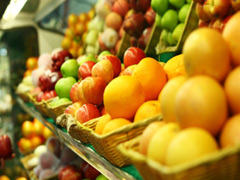3 Organic Food Myths That the Chemical Industry Want You to Believe
Jun 09
The chemical industry for foods would have you believe all kinds of things so you would buy their products. That’s why they spread organic food myths, which are simply not true. Here are three of the biggest organic food lies in the industry:

The first lie is that organic farming is just as bad for the environment as chemical-dependent industrial farming. The fact is though that ‘regular’ farming is extremely polluting to streams, rivers, wildlife, and topsoil, and it harms the environment a lot more than organic farming. In general, organic food farming relies on understanding nutrient cycling, crop diversity, and a variety of ecological processes that industrial farming just takes care of through chemical quick-fixes. So, it is one of the biggest organic food lies that organic farming does not help the environment in any way.
2) Organics have just as many pesticide residues
The second one of the organic food myths is that organic farming has the same amount of pesticide residue as industrial farming. But in reality, the produce that comes from organic farming – from strawberries to bananas to green and red peppers – has regularly demonstrated to have less pesticide residue (which is actually quite toxic) than non-organic produce. Research has been done to back this up, and every test that is ever conducted shows that organic produce has less toxicity and a lower concentration of pesticide residue. The fact that even a little pesticide residue was found was only due to the consequence of having used pesticides in the same fields in the past, which tend to remain in the soil, and has nothing to do with using pesticides in organic farming.
This is another one of the organic food myths that the chemical industry is propagating. But the fact is that all organic farms must have special certification, which actually protects from the contamination of E. coli. There are also strict regulations with regard to the use of compost and manure on organic farms. Certifiers of organic farms are also required to demonstrate that these farms comply with all regulations. The record keeping is detailed, especially when it comes to small farmers. Certifiers are expected to monitor everyone equally by the USDA. The USDA then checks these reports and sometimes even asks for more information. So, the notion that organic food could give you E. coli is almost bizarre, since there is so much inspection involved.
For more information go to: http://tiki.oneworld.net/pollution/disinformation.html
Related Posts
- Best organic farming practices
- Perks of the Portable Greenhouse
- Dr Oz Makes a Stand Against Genetically Modified Foods
- Why We Need the Good Food Revolution?
- Need Tips for Go Green Meals?
Leave a Reply
You must be logged in to post a comment.




